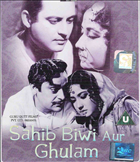Year: 1962
Dir: Abrar Alvi
Cast: Guru Dutt, Rehman, Meena Kumari, Waheeda Rehman
For most cinephiles Sahib Bibi Aur Ghulam might rank after Pyaasa and Kaagaz Ke Phool in Guru Dutt’s eternal classics-list but many critics regard it as his best ever work as a film-maker and I tend to side with them. It’s not just another disturbing tragic tale of human lives caught up in the vortex of fate in the typical Guru Dutt-mould; it also is a brilliant period-film portraying in minute detail the decadent Bengali feudal culture in the turbulent pre-independence times in the late nineteenth century. Based on Bimal Mitra’s Bengali novel, the film does give off an unmistakable feel of an intriguing novel being unfolded chapter by chapter in front of your eyes.
The movie starts off with a middle-aged architect Bhootnath (Guru Dutt) standing amongst the ruins of a once- grand haveli-(a sprawling mansion) and wistfully reminiscing about its past, which he had experienced first hand. A flashback now shows us the young Bhootnath- a rustic simpleton, who has come to Calcutta in search of a job. He gets a salesman’s job to sell ‘Mohini sindoor’- a specially made bridal vermilion, which is supposed to keep the husband faithful to his wife. Bhootnath starts staying in servants’ quarters in the haveli, owned by the Chowdhurys – the reigning zamindars (feudal lords). With morbid fascination, he keeps observing Chhote Babu (Rehman) and Manjhle Babu (Sapru) - the two Chowdhury-brothers living a lavish and carefree life- full of indulgences into liquor, courtesans and pigeon-races.
One day, Bhootnath is called up by Chhote Babu’s wife- the Chhoti Bahu (Meena Kumari), who wants to use Mohini Sindoor to keep her wayward husband to herself. Chhoti Bahu’s mesmerizing presence and her poignant persona leave Bhootnath overawed. As a confidante, he tries to help Chhoti Bahu but he ends up a heart-broken witness to her losing battle to claim her spousal rights, where she even leaves behind her traditional values- going to the extent of consuming alcohol just to win over her husband’s affection!
Even though there is also a sub-plot of Bhootnath’s own love-affair with his boss’s daughter Jabba (Waheeda Rehman), the film is really about Bhootnath’s insider view at the progressive decline and fall of the haveli and its high-brow inhabitants, which serve as metaphor for a decaying, dying feudal system.
Cleverly using flashbacks and giving a hauntingly atmospheric feel, director Abrar Alvi makes this film an unforgettable audiovisual experience. Guru Dutt (who refused to direct his own films after the commercial debacle of Kaagaz Ke Phool) just directed the songs but his stamp is evident on every frame- especially in the way he sensitively uses V.K. Murthy’s camera for those magical black-and-white, light-and-shadow images. Amongst a host of memorable performances, Meena Kumari stands apart with a life-time performance as a desperate housewife, prepared to go to any length to win back her husband’s love.
Sahib, Bibi Aur Ghulam is a flawless Guru Dutt-classic about a flawed social system.


